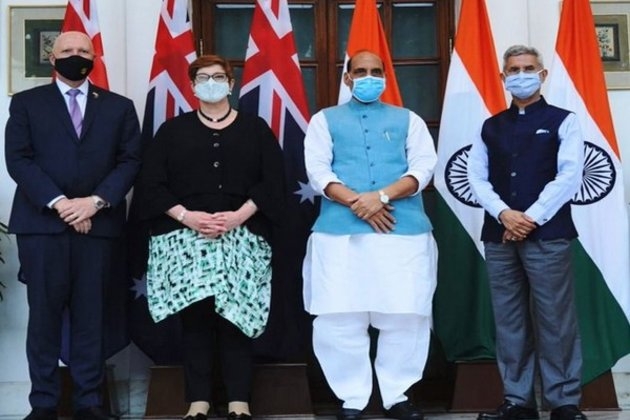New Delhi, Canberra call for inclusive government in Afghanistan for stability
The two sides "expressed deep concern about the situation in Afghanistan" and called on the "Taliban to guarantee safe passage for foreign nationals and Afghans wanting to leave the country".
Total Views |
New Delhi, September 13: Amid the ongoing geopolitical crisis, India and Australia have called for a "broad-based and inclusive" government in Afghanistan to ensure long-term peace and stability in the war-torn country.
India's Defence Minister Rajnath Singh, External Affairs Minister Dr. Jaishankar, Australian Foreign Minister Marise Payne, and Defence Minister Peter Dutton held the 2+2 dialogue in New Delhi in which a range of issues like Indo-pacific, Afghanistan, defense ties were discussed.

In a joint statement issued early on Sunday following the inaugural India-Australia 2+2 ministerial dialogue, the two sides "expressed deep concern about the situation in Afghanistan" and called on the "Taliban to guarantee safe passage for foreign nationals and Afghans wanting to leave the country".
Also Read |
New Delhi, Canberra, 2+2 meet, Afghanistan , taliban , Australia, United Nations Security Council, Afghans
In the joint statement they "reiterated calls on those in positions of power and authority" across Afghanistan to "adhere to counterterrorism commitments and human rights, in accordance with" United Nations Security Council Resolution 2593. UNSC resolution 2593, adopted on August 30 under India's presidency of the global body, demanded that Afghan territory should not be used to threaten or attack any country or to shelter and train terrorists and plan or finance terrorist attacks.
The two countries underlined the urgent need for all countries to take "immediate, sustained, verifiable and irreversible" action to ensure that no territory under their control is used for terrorist attacks and to expeditiously bring to justice the perpetrators of such strikes.
The joint statement said the ministers "noted reports of a rapid roll-back on women and girls’ rights and access to services and public spaces, as well as targeted violence against women’s rights defenders", and called on for "protection of rights of women and children and their full participation in public life". "In this regard, the ministers reiterated their call for protection of rights of women and children and their full participation in public life," it said.
"Ministers also agreed to remain alert to the broader repercussions of the developments in Afghanistan for the ongoing terrorist threats around the world, and in our region," the statement added.
Besides, Australia also expressed its strong support for India’s membership of the Nuclear Suppliers Group (NSG). Referring to the threat of terrorism, the two sides strongly condemned terrorism in all its forms and the use of terrorist proxies for cross-border terrorism.
Two sides agreed to continue cooperation in the sphere of counter-terrorism, including countering radicalisation and violent extremism, combating the financing of terrorism, and preventing exploitation of the internet for terrorist activities. The two sides also reiterated their commitment to furthering cooperation in counter-terrorism in multilateral fora such as the UN, G20, FATF, as well as in Quad consultations.
“They also reaffirmed their support for the early finalization and adoption of a UN Comprehensive Convention on International Terrorism that will advance and strengthen the framework for global cooperation and reinforce the message that no cause or grievance justifies terrorism,” the statement said.
.
.